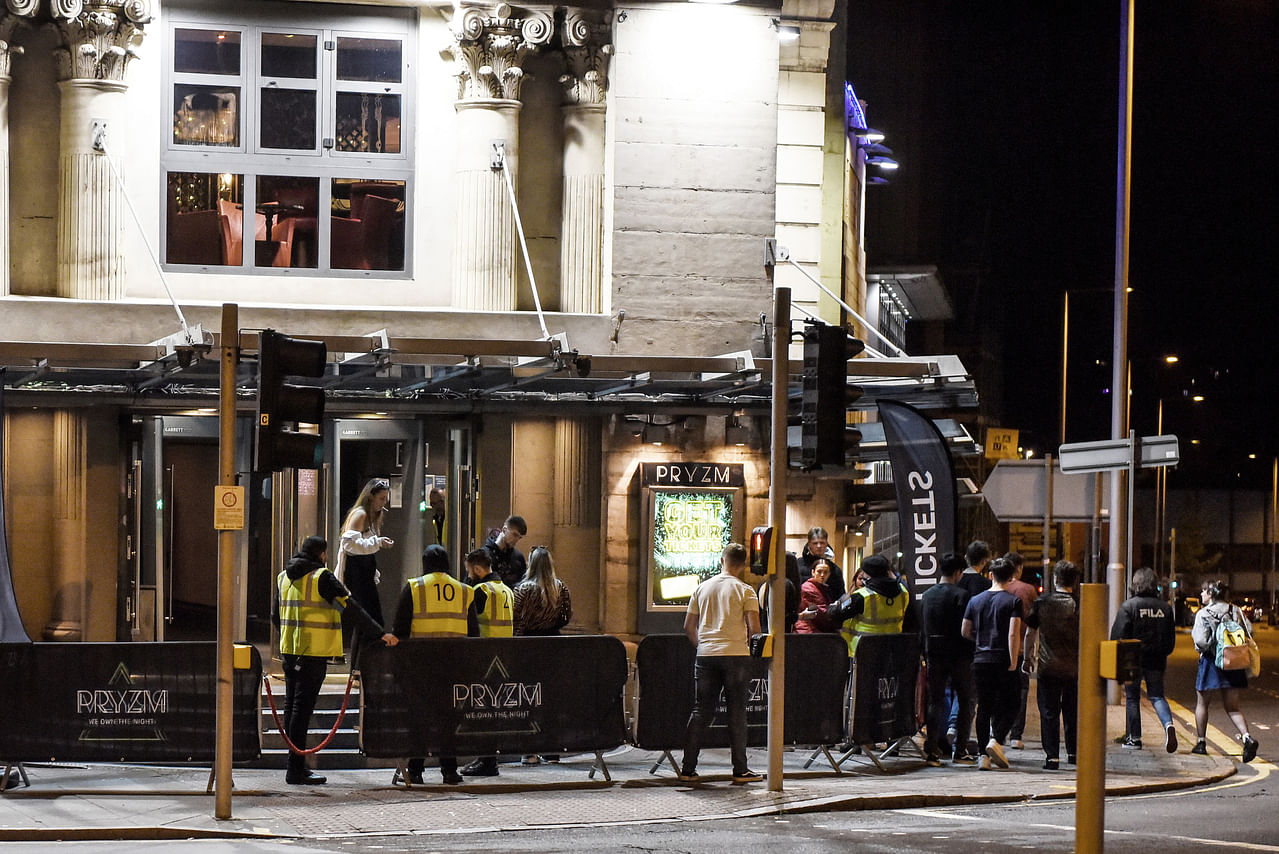'Needle spiking' of women in Britain stirs alarm over new kind of assault
Sign up now: Get ST's newsletters delivered to your inbox

Young revellers queue outside a popular Nottingham bar and lounge on Oct 20, 2021.
PHOTO: NYTIMES
Follow topic:
NOTTINGHAM (NYTIMES) - Lizzie Wilson was standing in a crowded nightclub on Monday night with three friends when she felt a sharp pinch in her back, as if she had been pricked by a needle. Ten minutes later, she was struggling to stand.
Wilson, 18, said she had heard about young women being injected with syringes at crowded clubs and immediately feared she was another victim. Her friends rushed her to the hospital, where she spent hours disoriented and without sensation in her legs.
"Nobody should ever go through that," said Wilson, a student in her first year of college in Nottingham in central England. "The most upsetting thing is, I could not control anything."
For more than a year, Britain has witnessed a disturbing spate of violence against women. High-profile abductions and murders have stirred a national conversation, inspired vigils and protests, intensified scrutiny of police, and prompted deeper exploration of the misogynistic culture often at the root of this violence.
Now come alarming reports, if still relatively small in number, of women being injected with syringes at crowded pubs and nightclubs, in a variation of "spiking", in which drugs are dropped into someone's drink, a crime that often targets women. A number of police forces in England are investigating reports of "needle spiking", including 12 incidents in Nottinghamshire. Police in Scotland are looking into similar reports.
Some who reported being spiked had effects "consistent with a substance being administered", police said in a statement, much like Wilson's account.
Female students have made the majority of reports, but some young men say they also have been victimised. Nottinghamshire police say no other offences, including sexual assault, have been linked to the reports of being injected, and there have been no known arrests for injecting someone; regardless, authorities say they are stepping up patrols and working with local universities and hospitals to investigate.
After pandemic restrictions shuttered campuses and night life for months, this school year was supposed to be a fresh start, with raucous nights out that many students see as a rite of passage.
But as these stories - and the fears surrounding them - have spread, young women have called for a boycott of clubs and also launched a petition calling for clubs to be required to search people on entering. To many women, the idea that they could be victimised by someone wielding a syringe at a nightclub is horrifying.
"If I didn't think I could be shocked anymore, if I didn't think the behaviour could get any lower, this is a new depth," said Sue Fish, the former chief of Nottinghamshire Police, who has long been an outspoken advocate for women's rights.
Worries about drinks being covertly laced with drugs have long been an issue. A 2019 BBC investigation revealed more than 2,600 cases of drink spiking in England and Wales since 2015.
Fiona Measham, professor and chair of criminology at the University of Liverpool and director of the Loop, a charity which monitors drug use in nightlife, said that there are a few hundred spiking cases nationally every year and described the risk as "quite low".
Of needle spiking specifically, she said, "It's not impossible, but it's really unlikely." But she said that each allegation needed to be investigated and taken seriously. "I think the anxieties are very real; the anger toward nightclubs is real," she said.
But many young people are not willing to wait for assessments. Local groups under an initiative called "Girls Night In" have popped up across the country calling for a boycott of clubs next week to raise awareness and demand better protections.

Some women are organising boycotts of clubs to protest acts of violence.
PHOTO: NYTNS
Ally Valero, 20, one of the students who set up the local Nottingham boycott, said the goal was not to signal that women should stay at home. It is intended to send a message to club owners that they must do a better job of ensuring the safety of patrons.
"We want to go out again," Valero said. "But we want to go out in a safer environment." Primrose Sparkes, 20, who helped launch a similar boycott at Durham University, said that in the past the main factor she considered before deciding whether to go out was whether she had an early morning class.
"Now it's: Do I feel safe?" she said. "There's an element of fear that wasn't there before."
Luis Danton, 20, a student and president of the soccer society at Nottingham Trent University, called the situation "mad" and said the team is planning to join the boycott.
"And a lot of people are scared, if I am being honest," he said.
Outside the sprawling Pryzm nightclub, students removed jackets and emptied their pockets before walking through a metal detector. The club says it has stepped up searches to reassure customers.

Extra security guards at the doors of the popular Pryzm nightclub in Nottingham.
PHOTO: NYTNS
At Jimmy Allens, a nightclub in Durham, the wait was unusually long Wednesday as bouncers frisked students and checked their bags - a policy introduced this week. Staff members have also begun wearing bodycams.
"It's taking people longer to get in, but it's worth it," said Darryl Watson, a manager.
Police in Durham said in a statement that though they were aware of posts online about spiking incidents by injection, they have not received any reports.
Regardless of how widespread the needle spiking is, at the root of the fears expressed by many young women is an awareness of the disproportionate risks they face.
"Women have always done all these sort of things to protect themselves when actually its men's behavior that needs to change," said Fish, the former police chief.
Putting the onus on women to fend off an attacker does not solve the problem, she said, adding, "What should women wear on a night out, a suit of armor?"

